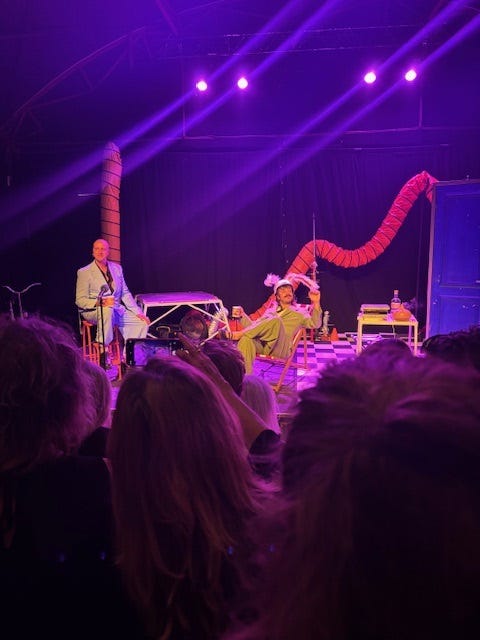You Have to Think of It, Right?
A reflection on a theatre show that explored the mystery of inspiration. Where does it truly come from? Is it something we create ourselves, or a gift from somewhere we cannot quite name?
Every summer, I visit The Parade in Amsterdam, a travelling festival with short theatre shows, food trucks, people sipping coffee or wine, eating bites, and just the coziness of family and friends enjoying their summer in Amsterdam.
This time, someone else had booked the theatre show, so I had no idea what I was walking into.
Every year I go, I laugh. This year, I laughed too. But my mind was also working overtime. The topic really made me think, and at a certain point, even worried.
The show was by Poezieboys and Explore The North, with the translated title
You Have to Think of It, Right?
They began with a short story (also available on the website, so no extra spoilers here).
I hear people say it often when they stand in front of a piece of art or read a poem: You have to think of it, right?
It sounds like a compliment, but hidden inside is a question.
Where does it come from? Do we invent it entirely ourselves? Or is it given to us by something, or someone, we cannot quite name?
I sat in the audience watching the Poezieboys perform. It was musical, strange, and funny. A glimpse into the rituals of writers and artists. Everything from exhausting yourself until something breaks loose, to talking to Martians, to opening yourself up to the cosmos.
Somewhere between the laughter, I caught a line that unsettled me. It suggested that maybe inspiration is not magic at all. Maybe our brains simply recycle what is already there. That no truly new thing ever comes into being.
I thought about big inventions like the internet and small things like my own writing. How often it arrives like an aha moment. Even when I try to set it aside and do something else, it stays with me until I put it down on paper. If that is not inspiration, then what is it?
It also made me think of something else. For years, most of my new ideas came to me during vacation. In those weeks where I was doing nothing in particular, ideas would arrive easily. The more space there was, the more they seemed to find me. It was like I would see more clearly. Is it inspiration? Intuition? Or just recycled thoughts? Or is that all the same anyway?
It made me wonder if inspiration is something we summon, or if it is simply patterns forming in the background, piecing themselves together from scraps we have already collected.
We live in a world built on planning and control. Meetings in calendars, reminders on screens, results to measure. There is comfort in that structure, but also risk. Because inspiration does not live in control. It needs space to wander, to arrive without warning. Right?
And maybe that is why artists protect their odd rituals, whatever they are. They know inspiration can be fragile. That the way it comes to you is worth guarding, even if it makes no sense to anyone else.
It left me thinking about my own life. About the moments when ideas arrived easily, and the moments they refused to come. About how often I try to chase them instead of making space for them.
It also made me think about work. In offices, we often talk about innovation, creativity, and fresh thinking, but our days are designed for the opposite. Schedules packed from start to finish. Tasks stacked on top of each other. Moments that could have been pauses filled with urgent emails. Maybe that is why the most original ideas often arrive outside the office, in the quiet of a holiday or on a walk home. Not because we are working less, but because we are finally making space for something else to come in.
It struck me that we celebrate creativity at work, but rarely create the conditions where it can actually happen. We ask for fresh thinking in back-to-back meetings. We demand innovation inside rigid routines. And then we wonder why the real breakthroughs often appear on holidays, in the shower, or in the in-between moments nobody planned.
Because maybe the real question is not How do I think of it? Maybe it is How do I make space for it to arrive?
So maybe the question is less about talent or discipline, and more about permission. Where in our lives do we still allow for empty space? For pauses that are not filled, for thoughts that are not rushed. Because inspiration might not be magic, but it still needs room to land.




I love how you turn a simple theatre visit into a meditation on creativity itself. The essay moves like thought does, circling, deepening, returning to its own questions. The final line stays with me: inspiration might not be magic, but it still needs room to land. That’s beautifully, quietly true. ✨